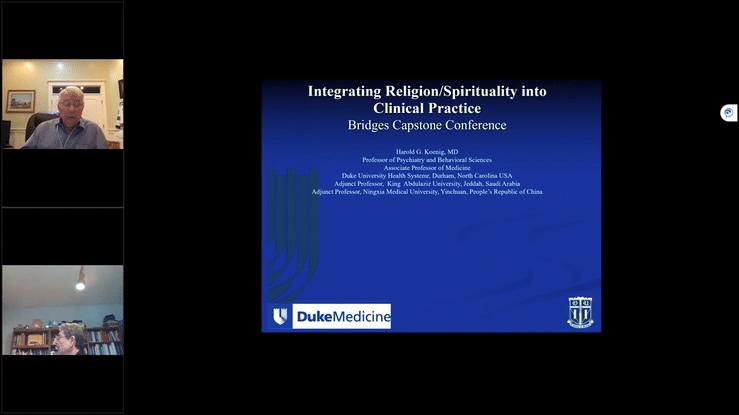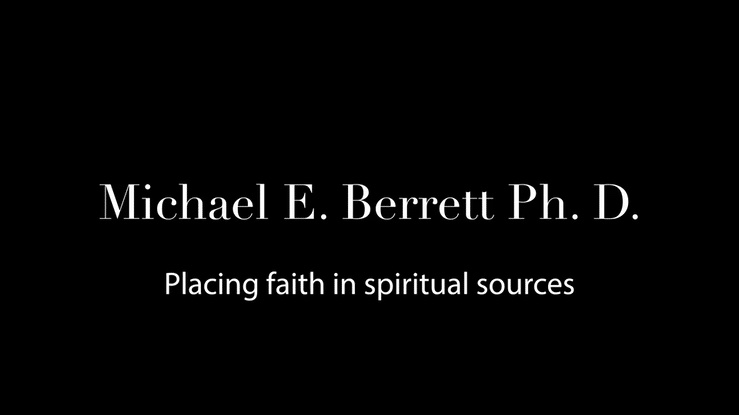Course 2: Affirm Faith

In Course 2, we discuss the great healing power of faith and spiritual convictions. We briefly discuss research evidence that shows that faith in God and spirituality are associated with better physical and mental health and that faith is a foundation spiritual principle for everyone, regardless of whether they are religious or not. We invite you to put your faith in something besides an illness, an addiction, or unhealthy habit. We invite you to put your faith in you, in your heart, in trustworthy loved ones, in God or a higher power, in the goodness of humans, and in your future. We invite you to think about how faith has helped you in the past and how it can help you in the future.
Lesson 1: The Power of Faith
We found that for many of our clients their personal spirituality was a source of great strength to them in their healing journeys. One of our eating disorder patients, Jan (not her real name) wrote the following letter about the importance of faith in God and spirituality in her recovery.
“A few months ago, I realized that I needed to seek medical help for my eating disorder, bulimia. But the more I thought about it, the more impossible it seemed that anyone could help me. I had no hope and absolutely no faith that I could overcome my eating disorder. After all, I had wasted and ruined the last four years of my life, hadn’t I? I’d been so obsessed with myself and trying to escape my problems with a temporary solution. I was addicted to my eating disorder and thought that there was no hope in anyone being able to help me. I would be a terrible, miserable, worthless sinner forever.
Then something changed. One night, as I was feeling so depressed and so alone, a dear friend encouraged me to pray and to read my scriptures. I thought to myself, “No way–like this will really do anything for me.” But then I decided that it couldn’t hurt me. So I knelt on my knees and cried to God. I told him how worthless and hopeless I felt and that I didn’t know what to do with myself. Then I pleaded with him to comfort me. I asked that if there was any way that I could find someone to help me to please let me find them. I expressed the feelings of doubt and hopelessness I felt about the possibility, but I did know that He knew all things. For the first time, I had a slight ounce of hope and faith that night. I was totally relying on God to save me from my darkness and hopelessness. Before I even ended my prayer, I started to feel a warm and comforting feeling, and I strangely knew that there was hope and that everything would turn out okay and that I would find help to overcome my bulimia. I thought that maybe there really would be a light at the end of the tunnel; the darkness would soon be gone.
Now that I have been going through inpatient treatment and therapy, I’ve learned that you have to have hope and faith in yourself and God. It’s the only way to win the battle. Without it you can never overcome any kind of obstacle.
It is essential to have hope and faith in order to find true happiness. Believe in yourself. Believe in God. If you do that, you can overcome anything that stands in your way. I’ve been doing that. And because of that I have found the light at the end of the tunnel. Now I must venture into the light to continue my journey with hope that brings happiness.”
Love Jan
The Faith Factor in Positive Mental Health
Many physicians and psychologists now believe that the deepest, most profound and lasting healing and change occur when people have faith in God and draw upon their spiritual beliefs and community to help them with their problems and challenges. Scientific studies have shown that people who have faith in God or a Higher Power and engage in spiritual practices such as prayer, meditation, reading sacred writings, and seeking support from members of their religious community tend to adjust better to crises and problems, cope better with illness, recover more readily from surgery, experience lower blood pressure, and generally enjoy better physical and mental health. Numerous books by physicians and psychologists have discussed this evidence; for example, Timeless Healing: The Power and Biology of Belief, by Herbert Benson, M.D., (1996: Scribner); A Spiritual Strategy for Counseling and Psychotherapy, by P. Scott Richards, Ph.D., and Allen E. Bergin, Ph.D., (2005: American Psychological Association), and Handbook of Religion and Health, by Harold G. Koenig, Michael E. McCullough, and David B. Larson (2001, 2012, 2021: Oxford University Press).
We are convinced that when people affirm their faith in God and seek to grow spiritually their strength and capacity to cope with and overcome the problems and challenges of life increase, regardless of whether their challenges are emotional, physical, relational, spiritual, or educational. We invite you to explore whether your own religious and spiritual beliefs, practices, and community may be of assistance to you in your journey of renewal and growth.
To learn more about current research findings regarding the relationship between religious involvement and mental health, we invite you to click on the link below to view a presentation Dr. Harold Koenig gave in 2019 at the Bridges Institute’s Capstone International Conference that was held virtually on March 19 – 20th, 2020.
Lesson 1 Application Activities
- In your journal, list any ideas or research findings from Jan’s testimony or Dr. Koenig’s presentation that resonated with you and that you think could be helpful in your own life.
- In your journal, briefly mention experiences and events in your life, and/or messages from significant people in your life, that have increased or strengthened your faith. Consider sharing what you learned with your therapist, spiritual leader, or trusted loved one.
Lesson 2: Placing Our Faith in Spiritual Sources
We worked with many people during the past 30 years who despite their diversity in age, gender, race, lifestyle, or religion, had in common the desire to overcome their problems and pain so that they could live happier and more rewarding lives. We have noticed that In addictive illness, eating disorders, and sometimes in other emotional struggles, a part of the developing and deepening illness is that the person suffering may unconsciously begin to place their faith in the illness itself.
We recognize that many people have had painful religious experiences during their childhood or adolescence, or even during their adult life. Although religion and spirituality can be very beneficial, if parents or other people in your life have used religious beliefs and practices as a way to control, shame or punish you, it may be more difficult for you to trust God or your Higher Power. There may also be other reasons why at this point in your life you feel like your faith and trust in spiritual sources is weak or even non-existent. Perhaps you feel like God has abandoned you and has failed to help you with your problems. Perhaps you feel that God does not love you, or displeased with you. Whatever the reasons may be, if you are willing to open yourself up to the possibility that your feelings can change, then we are optimistic that this can happen. We believe there are no exceptions to God’s love, forgiveness, and healing power and that you can begin to feel more spirituality and closeness to God or your Higher Power. .
In the video below, Dr. Michael Berrett talks about the importance of placing our faith in spiritual sources, rather than an illness, addiction, or other unhealthy behavior.
Lesson 2 Application Activity
- Talk to a loved one, your therapist if you have one, and/or write in your journal, about what or with whom you have put your faith in the past.
- Share and/or write in your journal about what you have you learned about faith from challenges and struggles you have experienced in your life.
Lesson 3: What is Faith?
The Bible defines faith in the following way: “Faith is the substance of things hoped for, the evidence of things not seen”(Hebrews 11: 1; King James version). Some individuals incorrectly assume that faith is a concept which is exclusively religious. Actually, faith is a concept which is historical, philosophical, psychological, religious, and spiritual. Faith operates in nearly a constant way in our lives, while the practice of it may increase the depth and breadth of our faith.
One way to increase the value and the power of faith in our lives is to notice it and to own it. We have to be willing to see it, and we can accept that it is a very real part of us. Another way to empower faith in our life is to direct it. This means that we realize that we choose where we will put our faith, and we become conscious and deliberate, and wise in what, whom, and where we will put our faith. We can also strengthen our faith by acting on it, practicing it – this means to trust it, take action in it, risk, live vulnerably , and do hard things. Last of all, we strengthen our faith by declaring it. No one increases their faith by hiding their faith and the object of their faith under a bushel basket. When we declare it and stand up for it – it becomes stronger.
Three Types of Faith
There are three common and healthy areas of life, in which individuals may place or put their faith: 1) Faith in the goodness and strength of themselves, 2) Faith in others who love and care about them, and 3) Faith in their spiritual source including but not limited to God, higher power, spiritual beliefs, spiritual practices, universe, or nature.
Faith in yourself: Despite the fact that all of us have and will made mistakes – faith can be well placed in yourself. This faith is not placed in ideas of perfection or perfectionism, but rather, in one’s strength, courage, ability to learn, good intent, general wisdom, and ability to listen to and follow your heart. It’s easier to have faith in yourself when perfection is not a requirement, when self-compassion available, and when you are willing to see the good in yourself.
Faith in others who love and care about us: This faith is important, but will not be easy for those who have been badly hurt in relationships, abused, ignored, or even let down or disappointed. This one will require some risk taking and vulnerability (of course under the guidance of wisdom). Despite their own frailties and weakness, many talented and loving partners, family members, friends, spiritual leaders, caretakers, therapists, doctors and others are often there, doing the best they can, with great interest in loving and serving those in their sphere of influence.
Faith in your spiritual sources including but not limited to God, higher power, spiritual beliefs, spiritual practices, universe, or nature. Understanding the power of your spirituality, spiritual beliefs and spiritual nature is important. This understanding can increase a sense of internal peace and comfort. Having faith in one’s spiritual beliefs leads to a practice of those beliefs, helps to take things learned into the realm of integration into our lives, which allows sharing, and eventually leads to becoming.
Lesson 3 Application Activity
- Share and/or write in your journal about what you now choose to put your faith in – now and in the future.
- Share and/or write in your journal about how your faith can help you grow, recover from difficulties, and find inner peace.
Lesson 4: Acting Upon our Faith
Everyone on the planet has a certain measure of faith – regardless of their religious or spiritual orientation. It takes great faith to get out of bed in the morning – believing that something good will come from our willingness, and our effort. It takes faith to see the doctor or have a session with a therapist. This faith in treatment, and in others, truly is a belief in something hoped for – but not seen. There is hope that being there will help in some way. Faith is active in our lives, even when we don’t label it as faith, and even when we do not notice that it is operating. Driving onto a busy street and walking towards a destination witness the faith of those who are so involved. They have faith that they will get there safely. We assume that you do have faith, that your faith has been a blessing in your life, and that your faith can be nurtured, strengthened, and empowered. We invite you to read the article below about faith as a principle of action that can bless our lives.
Lesson 4 Application Activity
- Reflect upon and share and/or write in your journal about how you plan to more fully act upon your faith.
Lesson 5: Spiritual Practice Spotlight
Meditation and Contemplation

“Meditation is the language of the soul. It is defined as a form of private devotion or spiritual exercise, consisting in deep, continued reflection on some religious theme. . . . Meditation is one of the most secret, most sacred doors through which we pass into the presence of the Lord.” (David O. McKay)
The word contemplate is defined in the dictionary as “to consider carefully and at length; meditate on or ponder” (American Heritage Dictionary, 1992, p. 406). Meditation is a form of contemplation that involves concentrated practice (Miller, 1994, p. 3). Smith (1975) defined meditation as a “family of mental exercises that generally involve calmly limiting thought and attention. Such exercises vary widely and can involve sitting still and counting breaths, attending to a repeated thought, or focusing on virtually [anything]” (p. 558). Both Western and Eastern religions encourage their followers to engage in various forms of contemplation and meditation—although the specific forms recommended may differ from tradition to tradition. There is much research evidence that meditation and contemplation, as well as spiritual imagery, can have significant healing effects on the mind and body (Benson, 1996). It also appears that such practices are more powerful when they draw on people’s deepest religious and spiritual convictions (Benson, 1996). There is evidence that contemplation, meditation, and spiritual imagery promote coping and healing in people with a variety of problems, including depression, anxiety, post-traumatic stress disorder, hypertension, cardiovascular problems, cancer, and weakened immune systems (Benson, 1996; Martin & Carlson, 1988).
Lesson 5 Application Activity
- We encourage you to arrange a time so you can be alone to meditate and contemplate about matters that are important to you, including your spiritual and emotional growth, your relationships with family and friends, or about your career and other important life goals. We suggest you write in your journal about insights, resolutions, and/or plans that feel important to you after doing so.
Course 2 Self-Check Quiz
Click on the button below if you would like to complete an optional self-check quiz about some of the content covered in Course 2. You are not being graded for the course and so the quiz is provided simply as an opportunity for you to review some of the important ideas presented in the course.
Spiritual Renewal for Positive Mental Health Questionnaire
Now that you have completed Course 2, we invite you to complete a spiritual renewal questionnaire that will help you gain greater insight into your spiritual beliefs and resources and how you can draw upon them in your journey of growth. Your responses are confidential and will never be shared in a way that would enable anyone to link your name and identity with your survey responses. After you complete the questionnaire, you will be sent a confidential summary of your results as feedback to assist you as you take the spiritual renewal courses.
Course 2 Evaluation and Feedback
We invite you to provide feedback about what content and activities in Course 2 you found most helpful and what you might recommend we change or add to the course to make it even better. Click on the button below to open the course evaluation/feedback survey.


